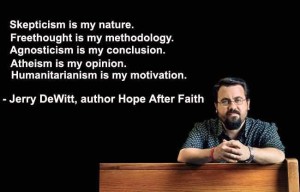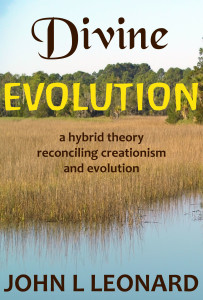Recently a friend of mine had an exchange on the internet with an atheist during which he asked what compelling evidence for an omnipotent (supernatural) deity might change the atheist's mind. My friend received this answer in reply: If all the stars were rearranged in the sky to spell "this is God communicating with you" and that everyone around the world could see it in their own language at the same time, then that would really make me change my mind. It's a good thing, knowing the standard for evidence of God has been set so low! (For the tone deaf, that was practically dripping with sarcasm.) I wondered to myself: does this person apply the same level of skepticism to climate change, or the theory of evolution? Was this person even being serious? After all, sciency types and the evangelists of scientism like to huff and puff about insufficient evidence for belief in a supernatural God, but they typically become quite vague or absurd when asked what it would specifically take to pass their personal threshold of disbelief. Then I remembered the wisdom of G.K. Chesterton, who said, "When men choose not to believe in God, they do not thereafter believe in nothing, they then become capable of believing in anything." At some point it occurred to me that this particular atheist might be thinking of author Douglas Adams as some sort of god. The evidence requested can be found on the pages of Adams's classic novel The Hitchhiker's Guide to the Galaxy. However, in that hilarious book, God's message was not conveyed to humanity by reorganizing stars to spell words, … [Read more...]
Lying for Jesus
If the ability to annoy atheists actually produced income, my personal wealth might rival that of Warren Buffett and Bill Gates. I don't even have to try hard. Merely expressing my opinion does the trick just about every time. Annoying atheists seems to be a talent that comes quite naturally, about as difficult for me as breathing. Of course, it isn't my intention to anger people that I've more than likely never met face-to-face, but often it can't be helped. My only alternative would be to remain silent about what I believe to be truth and keep my opinions to myself. However, we independent authors are expected to promote our own books, aren't we? How else might readers discover my work? A nonfiction book with a title such as Counterargument for God shouldn't leave much to the reader's imagination about where I stand on the subject of theology any more than Christopher Hitchen's book God is Not Great, or The God Delusion by Richard Dawkins. Now I don't consider myself a Christian apologist (even though I freely admit that I am a Christian) because I rarely if ever use theology to argue against atheism -- I prefer using clear logic, scientific evidence, an understanding of statistics and probability, and good, old-fashioned common sense to illogical arguments and Bible thumping. The (shorter) second section of my book defends my Christian beliefs (and the Bible, to some degree) against the most popular attacks used by prominent atheists like Dan Barker of the Freedom From Religion Foundation and David Silverman of American Atheists. When I "attack" atheism … [Read more...]



